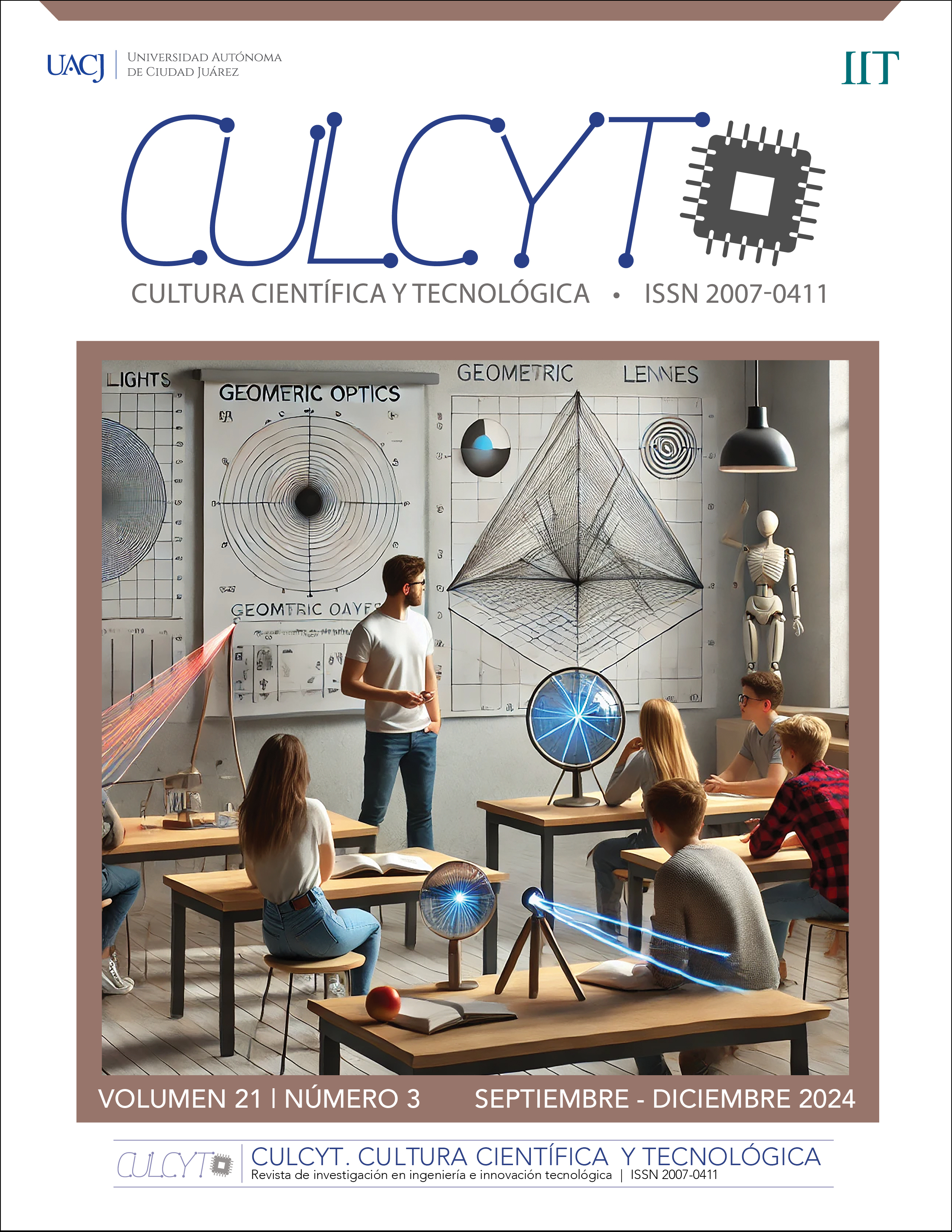Teaching geometric optics with the STEAM methodology at the high school
DOI:
https://doi.org/10.20983/culcyt.2024.3.2e.1Keywords:
STEAM, science, teaching, geometric opticsAbstract
This research aims to develop a teaching strategy with the STEAM methodology, in order to promote the understanding of basic optical principles and integrating knowledge of science, technology, engineering, art and mathematics. The study was carried out under a mixed research methodology, applied to 50 students in the last semester of high school at the Escuela Preparatoria Diurna, located in Ciudad del Carmen, Campeche, Mexico, who selected the optional subject of Selected Topics in Physics, with the aim of meeting the profile to study engineering. The STEAM approach was applied in the following three stages: inquiry, simulation and design and creation of an optical instrument. The results show that the implementation of the strategy favored learning, improving the understanding of the concepts and their relationship with practice. Eight optical instruments were developed, 6 classified as excellent in the categories of theoretical knowledge, practical skills and creativity and innovation. It is concluded that the application of the STEAM methodology helps to develop problem-solving skills, promotes a deep development of the topics so that students face challenges and, consequently, an increase in interest in the proposed topics.
Downloads
References
D. Y. Pineda, “Enfoque STEAM: Retos y oportunidades para los docentes”, RIPIE, vol. 3, n.º 1, pp. 229-244, dic. 2022, doi: 10.51660/ripie.v3i1.115.
J. Santillán, E. Jaramillo, R. Santos y V. Cadena, “STEAM como metodología activa de aprendizaje en la educación superior”, Pol. Con., vol. 5, n.º 8, pp. 467–492, 2020.
E. Asinc y S. Alvarado, “Steam como enfoque interdisciplinario e inclusivo para desarrollar las potencialidades y competencias actuales”, presentado en el 5to Congreso Internacional de Ciencias Pedagógicas de Ecuador, Guayaquil, Ecuador, 2019, pp. 1504-1514.
L. A. Monroy, L.-E. Mendoza y H. Alarcón-Acosta, “Educación STEAM en preparatoria”, prepa1, vol. 4, n.º 7, pp. 12-15, 2021.
C. E. Mora, C. del P. Suárez y J. Felix, coords., La enseñanza de la física y el modelo STEM. Ediciones Comunicación Científica, 2022, doi: 10.52501/cc.037.
Á. Vázquez y M. A. Manassero, “El declive de las actitudes hacia la ciencia de los estudiantes: un indicador inquietante para la educación científica”, Rev Eureka Ensen Divulg Cienc, vol. 8, n.º 3, pp. 274-292, 2008, doi: 10.25267/Rev_Eureka_ensen_divulg_cienc.2008.v5.i3.03.
F. Martínez, “Proyectos STEAM: Las matemáticas y el turismo espacial”, presentado en el Congreso Internacional de Centros Innovadores, Andalucía, may. 2022. [En línea]. Disponible en: https://raco.cat/index.php/DIM/article/view/402817/496519
V. Talanquer, “La importancia de la evaluación formativa”, Educación Química, vol. 26, n.º 3, pp. 177-179, jul. 2015, doi: 10.1016/j.eq.2015.05.001.
Ma. del S. Elizondo Treviño, “Dificultades en el proceso de enseñanza aprendizaje de la Física”, Presencia Universitaria, vol. 3, n.º 5, pp. 70-77, 2013.
A. Nuria y O. Lara, “La robótica educativa: Competencia STEAM y Creatividad”, en Libro de Resúmenes: 2.ª Conferencia Virtual en Investigación Educativa e Innovación, Ed., Adaya Press, 2018, p. 99.
Downloads
Published
How to Cite
Issue
Section
License
Copyright (c) 2024 Angel Farit Pereyra Arguelles

This work is licensed under a Creative Commons Attribution-NonCommercial 4.0 International License.
Todos los contenidos de CULCYT se distribuyen bajo una licencia de uso y distribución “Creative Commons Reconocimiento-No Comercial 4.0 Internacional” (CC-BY-NC). Puede consultar desde aquí la versión informativa de la licencia.
Los autores/as que soliciten publicar en esta revista, aceptan los términos siguientes: a) los/las autores/as conservarán sus derechos de autor y garantizarán a la revista el derecho de primera publicación de su obra; y b) se permite y recomienda a los/las autores/as agregar enlaces de sus artículos en CULCYT en la página web de su institución o en la personal, debido a que ello puede generar intercambios interesantes y aumentar las citas de su obra publicada.



